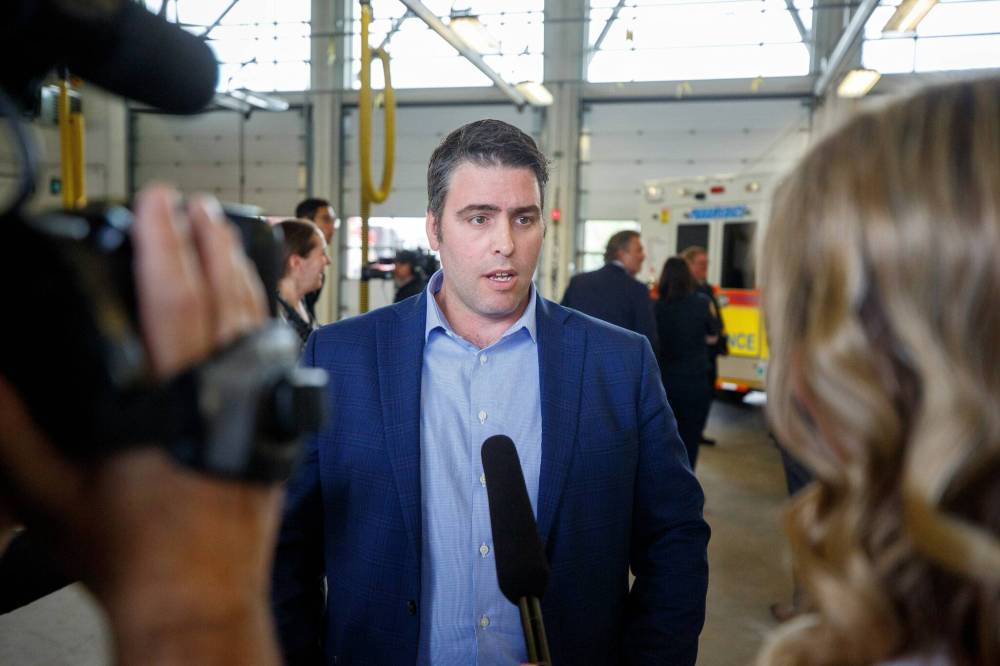Civil service labour strife poised to heat up
Thousands of MGEU members working under expired contract
Advertisement
Read this article for free:
or
Already have an account? Log in here »
To continue reading, please subscribe:
Monthly Digital Subscription
$0 for the first 4 weeks*
- Enjoy unlimited reading on winnipegfreepress.com
- Read the E-Edition, our digital replica newspaper
- Access News Break, our award-winning app
- Play interactive puzzles
*No charge for 4 weeks then price increases to the regular rate of $19.00 plus GST every four weeks. Offer available to new and qualified returning subscribers only. Cancel any time.
Monthly Digital Subscription
$4.75/week*
- Enjoy unlimited reading on winnipegfreepress.com
- Read the E-Edition, our digital replica newspaper
- Access News Break, our award-winning app
- Play interactive puzzles
*Billed as $19 plus GST every four weeks. Cancel any time.
To continue reading, please subscribe:
Add Free Press access to your Brandon Sun subscription for only an additional
$1 for the first 4 weeks*
*Your next subscription payment will increase by $1.00 and you will be charged $16.99 plus GST for four weeks. After four weeks, your payment will increase to $23.99 plus GST every four weeks.
Read unlimited articles for free today:
or
Already have an account? Log in here »
Hey there, time traveller!
This article was published 19/06/2023 (895 days ago), so information in it may no longer be current.
A massive labour dispute is simmering this summer as nearly 17,000 employees at Manitoba liquor marts, MPI and colleges are working under an expired contract and their union has told them to prepare for a strike vote.
The Manitoba Government and General Employees’ Union said it’s been at the bargaining table since March and the employer won’t take into considering high inflation and the sorry state of a civil service that’s struggling to recruit and retain workers.
“Strike is always the last resort and our goal is to bargain a deal at the table,” said Kyle Ross, president of the union that has 32,000 members. There are 11,000 provincial government employees, 1,780 at Manitoba Liquor and Lotteries, 1,716 at MPI and 2,000 MGEU members at Manitoba colleges. None of them has a collective agreement.

MIKE DEAL / WINNIPEG FREE PRESS FILES
There are 11,000 provincial government employees, 1,780 at Manitoba Liquor and Lotteries, 1,716 at MPI and 2,000 MGEU members at Manitoba colleges. None of them has a collective agreement.
In a bargaining update Wednesday, however, the workers were told that in order to get a new contract that helps revitalize provincial services and provides fair wage increases, the MGEU “will likely need to ask members to provide a strong strike mandate.”
In an interview, Ross called it “an unfortunate situation.”
“It means we’ve not had fruitful negotiations at the table and I don’t think the employers or the government understand the environment right now with the world we’re living in,” said Ross. “They’re in a different world, frankly. Their offers are out of the realm of reality. So it’s been a challenging time.”
Currently, 27 per cent of positions in the Manitoba public service are vacant after years of wage freezes and civil service cuts. It’s a struggle to fill them and maintain services, according to “State of the Civil Service 2023 — Cuts and privatization catching up with Manitoba’s public services.”
The MGEU report was unveiled Wednesday at the same time as its new slogan “Catch up, keep up.”
The union is looking for a contract similar to that of their federal counterparts that takes into account the rising cost of living and high inflation. The Public Service Alliance of Canada announced Friday that members who were on strike for 12 days in April have ratified a contract that includes a 12.6 per cent pay increase over four years and closes the gap with inflation.
“Last year alone, inflation was 7.8 per cent in Manitoba,” said Ross. “We have yet to see more than eight per cent offered over four years to our members,” he said.
“Food has gone up, fuel has gone up, housing has gone up. Our members are really feeling the pinch. They’re doing more with less. There’s less of them to do the job. It’s been really challenging,” Ross said.

MIKE DEAL / WINNIPEG FREE PRESS FILES
“Strike is always the last resort and our goal is to bargain a deal at the table,” said Kyle Ross, president of the union that has 32,000 members.
Because unionized workers’ wages are set by collective agreements that last several years, they’ve been hit harder by inflation than non-unionized workers, who have benefited from higher wage growth due to tight labour markets, said University of Manitoba economics Prof. Jesse Hajer.
Seeking a contract with pay bumps on par with their PSAC counterparts seems fair, said Hajer.
“It is reasonable that unions like MGEU are asking for increases to make up for these losses.”
Under the Progressive Conservative government, public sector workers have seen their purchasing power fall due to wage freeze legislation that while not enacted, set the bargaining mandate across government, and later high inflation, he said.
“The result has been falling real (inflation-adjusted) wages, uncompetitive salaries, and a deterioration of the public service in terms of a smaller civil service and very high vacancy rates,” he said.
“Since 2017, core civil service workers saw wages increase by 10 per cent, but over this period the cost of living increased by 22 per cent,” Hajer said. “This means that workers have seen the purchasing power of their wage fall by 12 per cent since 2017.
The situation is even worse for MGEU workers at MPI, MLCC and in the college sector, where wage losses have been in the 16 to 20 per cent range.”
In a statement, a spokesperson for Government Services Minister James Teitsma said the size of Manitoba’s core government has decreased since 2016 mainly because of “a natural attrition, fluctuations in seasonal staffing and the movement of approximately 900 employees from Manitoba’s public service to Shared Health last year.”
JOHN WOODS / WINNIPEG FREE PRESS FILES
“Since 2017, core civil service workers saw wages increase by 10 per cent, but over this period the cost of living increased by 22 per cent,” said Jesse Hajer, assistant professor of economics and labour studies at University of Manitoba.
“Our government is implementing recruitment strategies to address employment needs, focusing on key changes to advance innovation and the modernization of Manitoba’s public service,” the statement said.
“These changes are aimed at better outcomes for Manitobans as well as better value-for-money for taxpayers,” it said.
“Some organizational adjustments have been required, and efforts have been made to redeploy affected employees to other priority areas where possible. We are also filling priority vacancies to support continued direct service delivery, a data-driven workforce, succession planning and targeted outreach.”
carol.sanders@freepress.mb.ca

Carol Sanders
Legislature reporter
Carol Sanders is a reporter at the Free Press legislature bureau. The former general assignment reporter and copy editor joined the paper in 1997. Read more about Carol.
Every piece of reporting Carol produces is reviewed by an editing team before it is posted online or published in print — part of the Free Press‘s tradition, since 1872, of producing reliable independent journalism. Read more about Free Press’s history and mandate, and learn how our newsroom operates.
Our newsroom depends on a growing audience of readers to power our journalism. If you are not a paid reader, please consider becoming a subscriber.
Our newsroom depends on its audience of readers to power our journalism. Thank you for your support.




